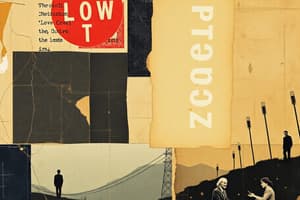Podcast
Questions and Answers
Which type of poetry is known for its unique structure of a five-syllable line, followed by a seven-syllable line, and then a five-syllable line?
Which type of poetry is known for its unique structure of a five-syllable line, followed by a seven-syllable line, and then a five-syllable line?
- Ode
- Haiku (correct)
- Sonnet
- Ballad
What is a defining feature of a sonnet?
What is a defining feature of a sonnet?
- A consistent rhyme scheme
- A total of 16 lines
- A 14-line structure with a variable rhyme scheme (correct)
- An emotional tone of longing
Which poetic device is defined as the recurring idea or theme throughout a literary work?
Which poetic device is defined as the recurring idea or theme throughout a literary work?
- Rhyme
- Theme (correct)
- Meter
- Stanza
What characteristic distinguishes free verse poetry?
What characteristic distinguishes free verse poetry?
Which type of poem is specifically written to mourn an individual or group, often ending on a note of hope?
Which type of poem is specifically written to mourn an individual or group, often ending on a note of hope?
What distinguishes an acrostic poem from other types of poetry?
What distinguishes an acrostic poem from other types of poetry?
Which feature of poetry defines the repeated patterns of sounds within a poem?
Which feature of poetry defines the repeated patterns of sounds within a poem?
What is the primary function of a poem written in free verse?
What is the primary function of a poem written in free verse?
Odes are distinguished by their:
Odes are distinguished by their:
In the context of poetry, what does 'mood' usually refer to?
In the context of poetry, what does 'mood' usually refer to?
Which of the following is NOT a characteristic of a sonnet?
Which of the following is NOT a characteristic of a sonnet?
What role does figurative language play in poetry?
What role does figurative language play in poetry?
Which of the following is true about an elegy?
Which of the following is true about an elegy?
What defines a stanza in poetry?
What defines a stanza in poetry?
What common feature relates both ballads and odes?
What common feature relates both ballads and odes?
Flashcards are hidden until you start studying
Study Notes
Types of Poetry
- Acrostic: A poem where the first letter of each line spells out a word or phrase.
- Ballad: A poem that tells a story, often with a simple rhythm and rhyme scheme.
- Elegy: A poem of mourning for a deceased individual or group, often ending with a message of hope or redemption.
- Free Verse: A poem with no consistent rhyme scheme or meter, allowing for flexibility in form and content.
- Sonnet: A 14-line poem with a specific rhyme scheme, originating in Italy and introduced to England in the 16th century.
- Ode: A poetic form that praises a person, place, or object, with no strict requirements for meter, rhyme scheme, or length.
- Haiku: A Japanese poetic form consisting of three lines with a 5-7-5 syllable structure, usually focused on nature or a specific moment.
Features of Poetry
- Stanza: A grouping of lines in a poem, separated by a blank line or indentation.
- Meter: The rhythmic pattern of stressed and unstressed syllables within a line of poetry.
- Rhyme: The repetition of similar sounds, particularly at the ends of words, used for emphasis or a sense of pattern.
- Theme: The overarching idea or concept explored within a poem.
- Tone: The writer's attitude or feeling towards the subject matter, which can be conveyed through word choice and structure.
- Mood: The overall feeling or atmosphere created by the poem for the reader.
- Figurative Language and Poetic Devices: Literary techniques used to create imagery, symbolism, and deeper meaning beyond the literal interpretation of words.
Types of Poetry
- Acrostic: A poem where the first letter of each line spells out a word or phrase.
- Ballad: A narrative poem often set to music, often telling a story of love, loss, or adventure.
- Elegy: A poem reflecting upon death or loss, often expressing sorrow and grief.
- Free Verse: Poetry with no fixed rhyme scheme or meter, allowing poets freedom in form and structure.
- Sonnet: A 14-line poem with a specific rhyme scheme, originating in Italy and introduced to England in the 16th century.
- Ode: A poem that praises a person or thing.
- Haiku: A short, unrhymed poem with a specific syllable structure: 5-7-5.
Features of Poetry
- Stanza: A group of lines in a poem, separated by a blank line or indentation.
- Meter: The rhythmic pattern of stressed and unstressed syllables in a line of poetry.
- Rhyme: The repetition of similar sounds at the end of lines in a poem, used to create a pattern or rhyme scheme.
- Theme: The central idea or message of a poem.
- Tone: The attitude or voice of the speaker in a poem.
- Mood: The feeling or atmosphere created by a poem for the reader.
- Figurative Language and Poetic Devices: Methods used in poetry to create imagery and evoke different interpretations of words, such as similes, metaphors, and personification.
Studying That Suits You
Use AI to generate personalized quizzes and flashcards to suit your learning preferences.



